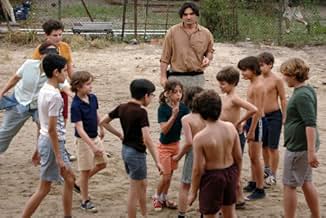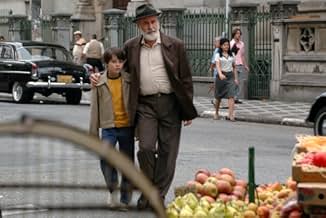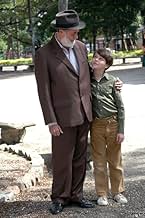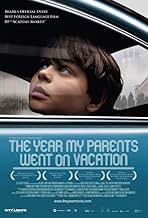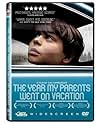IMDb रेटिंग
7.3/10
6.8 हज़ार
आपकी रेटिंग
अपनी भाषा में प्लॉट जोड़ेंA boy is left alone in a Jewish neighborhood in 1970, when the World Cup coincides with political crackdowns by the military dictatorship.A boy is left alone in a Jewish neighborhood in 1970, when the World Cup coincides with political crackdowns by the military dictatorship.A boy is left alone in a Jewish neighborhood in 1970, when the World Cup coincides with political crackdowns by the military dictatorship.
- पुरस्कार
- 32 जीत और कुल 38 नामांकन
फ़ीचर्ड समीक्षाएं
In 1970, near the World Cup, Daniel Stern (Eduardo Moreira) and his wife Miriam (Simone Spoladore) leaves Belo Horizonte in a hurry and scared with their ten years old son Mauro (Michel Joelsas) in their Volkswagen. While traveling to São Paulo, the couple explains Mauro that they will travel on vacation and will leave Mauro with his grandfather Mótel (Paulo Autran). Daniel promises to return before the first game of the Brazilian National Soccer Team in the Cup. The boy is left in Bom Retiro, a Jewish and Italian neighborhood, and waits for Mótel in front of his apartment. When the next door neighbor Shlomo (Germano Haiut) arrives, he tells the boy that Mótel had just had a heart attack and died. Alone and without knowing where his parents are, the boy is lodged by Shlomo and the Jewish community. Through the young neighbor Hanna (Daniela Piepszyk), Mauro makes new friends, cheers for the Brazilian team and sees the movement of the police and militaries on the streets while waiting for his parents.
In 1970, 90 millions of Brazilians were cheering for the National Soccer Team in the World Cup while the dictatorship had the toughest and cruelest moment against the opposition. I found this touching and sensitive movie amazing, since the director Cao Hamburger was able to brilliantly work with amateurish children and achieve outstanding performances, exposing the political situation of that milestone of Brazilian contemporary history through the eyes of a middle-class boy of ten years old. For me, it is absolutely impressive because I had approximately the same age of Mauro in 1970 and I lived that moment going to school, playing soccer and buttons, going to the beach and to the movie theater and cheering for our National Soccer Team without knowing or understanding clearly what was happening. The story is very simple and dramatic, but never corny, and the very convincing performances of the cast is awesome and touching. Michel Joelsas and Daniela Piepszyk have key roles in the story and I dare to write that two stars are born. My vote is ten.
Title (Brazil): "Ano em Que Meus Pais Saíram de Férias, O" ("The Year When My Parents Went on Vacation")
In 1970, 90 millions of Brazilians were cheering for the National Soccer Team in the World Cup while the dictatorship had the toughest and cruelest moment against the opposition. I found this touching and sensitive movie amazing, since the director Cao Hamburger was able to brilliantly work with amateurish children and achieve outstanding performances, exposing the political situation of that milestone of Brazilian contemporary history through the eyes of a middle-class boy of ten years old. For me, it is absolutely impressive because I had approximately the same age of Mauro in 1970 and I lived that moment going to school, playing soccer and buttons, going to the beach and to the movie theater and cheering for our National Soccer Team without knowing or understanding clearly what was happening. The story is very simple and dramatic, but never corny, and the very convincing performances of the cast is awesome and touching. Michel Joelsas and Daniela Piepszyk have key roles in the story and I dare to write that two stars are born. My vote is ten.
Title (Brazil): "Ano em Que Meus Pais Saíram de Férias, O" ("The Year When My Parents Went on Vacation")
Twelve-year-old Mauro (Michel Joelsas) is a soccer fan who spends hours playing table soccer in his suburban home in Belo Horizonte, Brazil and fantasizes about playing soccer with Pelé and Tostao, the heroes of the Brazilian soccer team that is about to compete for its third World Cup title. He hardly even blinks when his parents tell him that they are going on vacation and will be dropping him off at his grandfather's apartment in Sao Paolo. Brazil's official submission for the 2008 Oscars in the Best Foreign Film category, The Year My Parents Went on Vacation contains all the ingredients for a Hollywood-style exercise in cliché-ridden sentimentality an adorable young boy, a cantankerous but wise old man, and a world-class sports tournament. Yet director Cao Hamburger meshes these elements into a film that is nuanced, honest, and genuinely touching and, in the process, shows how an attitude of welcoming hospitality can make a difference in the lives of those who feel abandoned.
Set in Brazil in 1970 against a backdrop of military dictatorship, Mauro's father (Eduardo Moreira) and Catholic mother (Simone Spoladore) have been forced to go underground because of their political opposition to the government of General Emilio Medici, a military dictator but do not reveal to Mauro the truth about their leaving. Telling the boy that they will come back for him before the start of the World Cup Soccer Tournament, they deliver him to the home of his grandfather Motel (Paulo Autran) in the mostly Jewish Bom Retiro district of Sao Paulo but do not realize that grandpa has just died of a heart attack in his barbershop.
Tired of waiting for his grandfather to return, Mauro enlists the help of a neighbor, an aging Jewish bachelor Shlomo (Germano Haiut) who reluctantly takes him in but is not happy with his newfound task of caring for the youngster. He chastises the boy after he rejects eating herring for breakfast and slaps him across the face when he plays soccer in the hallways while wearing his prayer shawl. Shlomo becomes even more petulant when he inadvertently discovers that Mauro (whom he has been calling Moishela) is a "goy" who has not been circumcised (a very unlikely event when there is a Jewish father). It is only when the rabbi tells him that, like Moses, Mauro has been left on his doorstep by God that he begins to treat Moishela with respect and invites members of the local synagogue to offer him lunch each day at their different apartments.
Mauro's love of soccer helps him to befriend the local Jewish children, forming a bond with adorable 11-year-old Hanna (Daniela Piepsyk) and the community of Italian, Greek and Arab immigrants who are united in their devotion to the Brazilian soccer team. Joelsas is excellent as the highly intelligent energetic boy who must adapt to a strange environment far removed from his familiar surroundings. The film is almost stolen, however, by Piepsyk as the tomboyish Hanna who collects money from the boys to give them a peek at women trying on clothes in her mother's dress shop. When the World Cup begins, however, all the attention in the neighborhood is on soccer but for Mauro, it is mostly a reminder of his parents promise to return.
Spoken mostly in Yiddish, The Year My Parents Went on Vacation contains elements of The Cup, Running on Empty, and Under the Same Moon, but distinguishes itself by the freshness of its light-hearted approach and the outstanding performances of its mostly non-professional actors. Though not primarily a political coming-of-age film, when Hamburger deftly shifts from a rock n' roll dance floor to the sound of fascist soldiers on horseback making arrests of suspected dissidents, it is a jarring introduction to a young man's loss of innocence.
Set in Brazil in 1970 against a backdrop of military dictatorship, Mauro's father (Eduardo Moreira) and Catholic mother (Simone Spoladore) have been forced to go underground because of their political opposition to the government of General Emilio Medici, a military dictator but do not reveal to Mauro the truth about their leaving. Telling the boy that they will come back for him before the start of the World Cup Soccer Tournament, they deliver him to the home of his grandfather Motel (Paulo Autran) in the mostly Jewish Bom Retiro district of Sao Paulo but do not realize that grandpa has just died of a heart attack in his barbershop.
Tired of waiting for his grandfather to return, Mauro enlists the help of a neighbor, an aging Jewish bachelor Shlomo (Germano Haiut) who reluctantly takes him in but is not happy with his newfound task of caring for the youngster. He chastises the boy after he rejects eating herring for breakfast and slaps him across the face when he plays soccer in the hallways while wearing his prayer shawl. Shlomo becomes even more petulant when he inadvertently discovers that Mauro (whom he has been calling Moishela) is a "goy" who has not been circumcised (a very unlikely event when there is a Jewish father). It is only when the rabbi tells him that, like Moses, Mauro has been left on his doorstep by God that he begins to treat Moishela with respect and invites members of the local synagogue to offer him lunch each day at their different apartments.
Mauro's love of soccer helps him to befriend the local Jewish children, forming a bond with adorable 11-year-old Hanna (Daniela Piepsyk) and the community of Italian, Greek and Arab immigrants who are united in their devotion to the Brazilian soccer team. Joelsas is excellent as the highly intelligent energetic boy who must adapt to a strange environment far removed from his familiar surroundings. The film is almost stolen, however, by Piepsyk as the tomboyish Hanna who collects money from the boys to give them a peek at women trying on clothes in her mother's dress shop. When the World Cup begins, however, all the attention in the neighborhood is on soccer but for Mauro, it is mostly a reminder of his parents promise to return.
Spoken mostly in Yiddish, The Year My Parents Went on Vacation contains elements of The Cup, Running on Empty, and Under the Same Moon, but distinguishes itself by the freshness of its light-hearted approach and the outstanding performances of its mostly non-professional actors. Though not primarily a political coming-of-age film, when Hamburger deftly shifts from a rock n' roll dance floor to the sound of fascist soldiers on horseback making arrests of suspected dissidents, it is a jarring introduction to a young man's loss of innocence.
10aharmas
Seldom does a film capture the essence of a period without sacrificing its soul. Hollywood works wonders with its budgets to recreate a long gone era, but most of those production offer empty shells, without much to care for. True, at their best, they carry a single emotion forward, and when its loud most of notice, but we leave without much emotional investment. This film stays inside your heart because it reaches deep with its message, with the purity of its storytelling, and most importantly with the powerful and yet quiet delivery of the its main performers.
Here there are no breathtaking special effects, but we keep catching our breath, as we follow the tale of a boy who must soon realize his life will never be the same. Pivotal events occur right before he must enter the traumatic stage of adolescence. There is still much wonder in his spirit, and his innocence is still pretty much in effect, as he captures the hearts and sympathy of people who barely know him. He is not a precocious youngster, only one who suddenly faces a crisis that he is not able to truly understand.
Eventually, as the film reaches its climax, his use of language demonstrates he has grown up. His silences represent a new understanding. Yet as he leaves us, we know he will always recall this special time in his life with much affection and wonder, and those qualities are so vivid throughout the movie that it is hard to dismiss this film as just another children's movie. It is heavily dependent on the very good work of two young performers, but it is ahaded with political references, with nostalgic touches of long gone eras, so we are enveloped by those powerful emotions, and yet, we know that what we are witnessing is part of our fabric and they will eventually recycle to create more stories like these. It is a very personal movie, one that should be commended by its ability to provide us with an exquisite sense of detail, with careful appreciation of the cultural forces that make a community, and the common bounds that we have in our different communities.
This just happens to be Brazil, a world that is always vibrant and admired by its contributions to world culture, a country long associated with soccer, that is now showing another facet of its multicultural fabric: a Jewish community. However, this is just another sweet element in the mix, one that serves as the background of a world that is ever changing, a world pulled apart by forces, and yet with an ability to heal and grow.
Mauro is not an observant, but he is a witness to turmoil that he doesn't understand. He is consistent and determined, never giving up on the hope he will see his parents again. There is no heartbreak, but we see how he at times needs to release his frustration and pain. There are no emotional fireworks, but great displays of how strong a common event can cross borders and ethnic differences, and for a while unite us all. Mauro shows us how a child thinks and behaves, how he is forced to understand and grow, even when he is not really ready, yet.
The movie is delicate, never loud, never too obvious in its delivery. The direction is subtle and masterful, never yelling at us, and never showing us demonic portrayals to show us the evil that exists in our world. Here is a director that can makes us appreciate the sense of loss, the beauty of transformation and growth, the agony of hopelessness, and a myriad of feelings that few movies in Hollywood can ever do.
Only one question remains: Why was this film ignored and not included in the Foreign film category? It is released early in this year, on its way to be a forgotten jewel in the world of cinema, with no chance at recognition much later because inexplicable oversight and bias is now delivering a message that unless not so subtle advertising and careful placement in the last three months of the year, a film is not worth the recognition it would otherwise deserve. It is time that the agency that so call recognizes quality in the art of cinema revamps a system that is now going stale and is truly disappointing those of us who really love good movies whenever they arrive and whatever genre and origin they might be. This film is indeed a sweet vacation from a very crowded and loud world.
Here there are no breathtaking special effects, but we keep catching our breath, as we follow the tale of a boy who must soon realize his life will never be the same. Pivotal events occur right before he must enter the traumatic stage of adolescence. There is still much wonder in his spirit, and his innocence is still pretty much in effect, as he captures the hearts and sympathy of people who barely know him. He is not a precocious youngster, only one who suddenly faces a crisis that he is not able to truly understand.
Eventually, as the film reaches its climax, his use of language demonstrates he has grown up. His silences represent a new understanding. Yet as he leaves us, we know he will always recall this special time in his life with much affection and wonder, and those qualities are so vivid throughout the movie that it is hard to dismiss this film as just another children's movie. It is heavily dependent on the very good work of two young performers, but it is ahaded with political references, with nostalgic touches of long gone eras, so we are enveloped by those powerful emotions, and yet, we know that what we are witnessing is part of our fabric and they will eventually recycle to create more stories like these. It is a very personal movie, one that should be commended by its ability to provide us with an exquisite sense of detail, with careful appreciation of the cultural forces that make a community, and the common bounds that we have in our different communities.
This just happens to be Brazil, a world that is always vibrant and admired by its contributions to world culture, a country long associated with soccer, that is now showing another facet of its multicultural fabric: a Jewish community. However, this is just another sweet element in the mix, one that serves as the background of a world that is ever changing, a world pulled apart by forces, and yet with an ability to heal and grow.
Mauro is not an observant, but he is a witness to turmoil that he doesn't understand. He is consistent and determined, never giving up on the hope he will see his parents again. There is no heartbreak, but we see how he at times needs to release his frustration and pain. There are no emotional fireworks, but great displays of how strong a common event can cross borders and ethnic differences, and for a while unite us all. Mauro shows us how a child thinks and behaves, how he is forced to understand and grow, even when he is not really ready, yet.
The movie is delicate, never loud, never too obvious in its delivery. The direction is subtle and masterful, never yelling at us, and never showing us demonic portrayals to show us the evil that exists in our world. Here is a director that can makes us appreciate the sense of loss, the beauty of transformation and growth, the agony of hopelessness, and a myriad of feelings that few movies in Hollywood can ever do.
Only one question remains: Why was this film ignored and not included in the Foreign film category? It is released early in this year, on its way to be a forgotten jewel in the world of cinema, with no chance at recognition much later because inexplicable oversight and bias is now delivering a message that unless not so subtle advertising and careful placement in the last three months of the year, a film is not worth the recognition it would otherwise deserve. It is time that the agency that so call recognizes quality in the art of cinema revamps a system that is now going stale and is truly disappointing those of us who really love good movies whenever they arrive and whatever genre and origin they might be. This film is indeed a sweet vacation from a very crowded and loud world.
The premise appears simple, but that's only on surface. Suddenly, the country is divided between the euphoria of the 1970 World Cup (in which Brazil was champion for the third time) and the anguish of the dictatorship. That could be good material for biting social critique, but the movie takes a radically different path. It follows the life of a kid, whose parents are leaving for "vacations". He's left at his grandfather's apartment, only to find out that he died hours before his arrival. Finding himself in the unnatural environment of a Jewish community, having no news about his parents and having to live with a grumpy old man, he finds comfort in football and everything that deals with it.
Fans of the hyperactivity and non-linearity of City Of God will have to expect a completely different style here. While there are flashes of comedy and quirkiness, the movie is very focused and delicately paced. There isn't a lot that can be told here, really, and I won't go on spoiling the story. Check it out for yourself, if only to witness the clashing contrast between two opposite realities in a way no history book could deliver.
Fans of the hyperactivity and non-linearity of City Of God will have to expect a completely different style here. While there are flashes of comedy and quirkiness, the movie is very focused and delicately paced. There isn't a lot that can be told here, really, and I won't go on spoiling the story. Check it out for yourself, if only to witness the clashing contrast between two opposite realities in a way no history book could deliver.
"O Ano em Que Meus Pais Saíram de Férias" is the most important Brazilian export of 2007, and as many said, a strong contender for the Academy Awards. The movie was beautiful: the cinematography, the music, the actors. The scenery was perfectly created and it looked perfectly like São Paulo and Brazil in the 1970's. With all that, the movie still failed to excite me or create any major emotion. The movie was very flat, and ran without a climax. Plus I wasn't very familiar with the 70's history, and the fact that the movie doesn't go deeper into the issues of the time got me a bit confused. I recommend a little researching prior to watching the movie. Overall, the movie was OK, but the characterization should have been developed further and some kind of bigger conflict should have brought excitement to the movie.
क्या आपको पता है
- ट्रिवियाBrazil's Official Submission to the Best Foreign Language Film Category of the 80th Annual Academy Awards. The film was one of the nine films that made it to the January's short list but failed to secure the nomination.
- गूफ़When Mauro arrives in São Paulo, he looks out to the car window noticing the tall buildings - the known Banespa Tower (now Farol Santander) and the Marchetti building, located in the city's downtown. Not only it's a shot on reverse but completely unpractical to the place he and his parents were going - Bom Retiro is located below downtown - and the particular area they were going, shot from right to the left, is completely off traffic since it's an one-way street that only moves from left to right.
- कनेक्शनFeatured in Por Dentro do Filme 'O Ano em que Meus Pais Saíram de Férias' (2006)
टॉप पसंद
रेटिंग देने के लिए साइन-इन करें और वैयक्तिकृत सुझावों के लिए वॉचलिस्ट करें
विवरण
- रिलीज़ की तारीख़
- कंट्री ऑफ़ ओरिजिन
- भाषाएं
- इस रूप में भी जाना जाता है
- The Year My Parents Went on Vacation
- फ़िल्माने की जगहें
- उत्पादन कंपनियां
- IMDbPro पर और कंपनी क्रेडिट देखें
बॉक्स ऑफ़िस
- बजट
- R$30,00,000(अनुमानित)
- US और कनाडा में सकल
- $8,07,117
- US और कनाडा में पहले सप्ताह में कुल कमाई
- $80,655
- 17 फ़र॰ 2008
- दुनिया भर में सकल
- $32,18,370
- चलने की अवधि1 घंटा 50 मिनट
- रंग
- ध्वनि मिश्रण
- पक्ष अनुपात
- 1.85 : 1
इस पेज में योगदान दें
किसी बदलाव का सुझाव दें या अनुपलब्ध कॉन्टेंट जोड़ें

टॉप गैप
By what name was O Ano em que Meus Pais Saíram de Férias (2006) officially released in India in English?
जवाब






